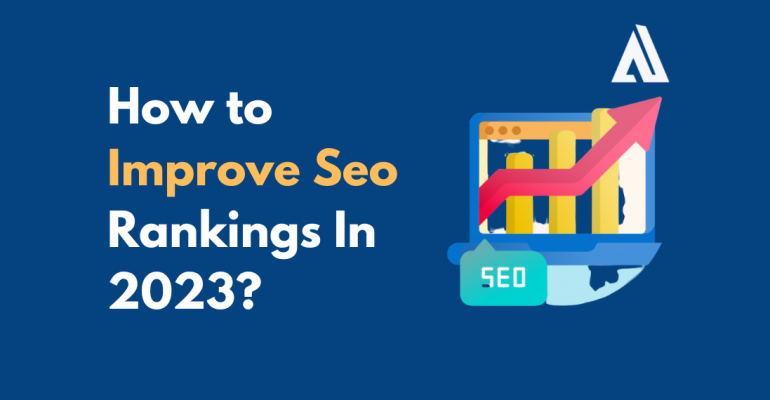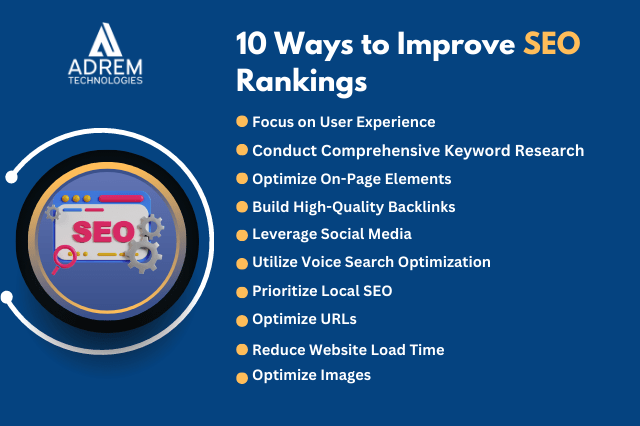How to Improve SEO Rankings In 2023?

How to Improve SEO Rankings In 2023?
One of the main goals of successful online businesses is to increase organic traffic and improve SEO rankings. Therefore, in order to appear first in search engine recommendations for certain queries, brands all over the world compete. But turning this goal into a reality is easier said than done.
Search engine optimization (SEO) is important since it enables you to move up the search engine results pages (SERPs) and boost the exposure of your website to draw in more visitors.
SEO is an ever-evolving process that requires constant attention and adaptation. With the changes in search engine algorithms and technological advancements, keeping up with the latest SEO trends is important to improve your website’s ranking in 2023. Therefore, your website needs a strong content strategy for SEO.
This blog will discuss several best practices that can make you stand out from the crowd and improve your SEO rankings.
10 Ways to Improve SEO Rankings in 2023
The following are some ways that you can use to boost your SEO rankings in 2023:
 1. Focus on User Experience
1. Focus on User Experience
In recent years, Google has increasingly prioritized user experience as a ranking factor. This means that websites that offer a positive user experience are more likely to rank higher in search results. To improve user experience, focus on page load speed, mobile responsiveness, clear navigation, and high-quality content.
2. Conduct Comprehensive Keyword Research
Researching relevant keywords is the basis of search engine optimization. It is essential to determine which keywords your target audience is searching for that are relevant and receive significant search engine traffic.
By creating tailored content for those keywords, you will have a better chance of increasing your website’s exposure in search results. For in-depth keyword research, make use of several tools such as Google’s Keyword Planner, SEMrush, Ahrefs, etc.
3. Optimize On-Page Elements
On-page optimization refers to the process of improving the ranking of individual web pages within search engines to attract more visitors. This includes optimizing your targeted keywords’ title tags, meta descriptions, headers, and content. In addition, make sure your content is well-organized, easy to read, and relevant to the user’s search intent.
You may boost your website’s relevancy and ranking in search engine results by using on-page optimization, which will also help you attract more organic traffic.
4. Build High-Quality Backlinks
Backlinks are crucial for SEO because they show search engines that other websites value and trust your content. So concentrate on constructing trustworthy backlinks from websites in your field. This can be accomplished by contacting influencers, developing broken links, and writing guest posts.
You may boost the authority and relevance of your website in the search engine results pages and attract more organic visitors to your site by concentrating on building high-quality backlinks from reputable websites in your field.
Read More: Why Your Website Needs a Strong Content Strategy for SEO?
5. Leverage Social Media
Your internet presence can be increased, and your SEO rankings can be boosted with the help of social media. You may reach a larger audience and increase traffic to your website by sharing your material on social media sites like Facebook, Twitter, and LinkedIn.
When you share your content on social media, it not only helps to increase your website’s visibility but also creates opportunities for others to share and link back to your content.
To maximize the impact of social media on your SEO, it’s essential to optimize your social media profiles with relevant keywords and links to your website. This can help search engines understand the context and relevance of your social media profiles, improving your chances of appearing in relevant search results.
6. Utilize Voice Search Optimization
The need to optimize your website for voice search is growing as more people use voice search assistants like Siri, Alexa, and Google Assistant. Voice search allows users to interact with search engines using natural language and conversational queries, significantly impacting how people search for and consume content.
To optimize your website for voice search, you must consider the unique characteristics of voice search queries. Unlike traditional text-based searches, voice search queries are longer and more conversational. This means you need to focus on using long-tail keywords and phrases that reflect how people speak naturally.
7. Prioritize Local SEO
If your business has a physical location, prioritizing local SEO can be highly beneficial. Targeting location-based keywords and enhancing your visibility in local search results are the goals of local SEO, which entails improving your website and online presence.
This might be particularly crucial for companies like brick-and-mortar shops, eateries, and service providers that depend on local clients.
Making a Google My Business profile is one of the best strategies to enhance local SEO. You can manage your business’s online visibility throughout Google, including search and maps, with the help of the free tool Google My Business. You can increase your exposure in local search results, give customers useful information about your business, and draw more foot traffic to your physical location by setting up and improving your Google My Business page.
8. Optimize URLs
Optimizing URLs is an essential component of SEO. A well-optimized URL can help search engines and users understand the content of a webpage and improve the website’s overall SEO performance.
To optimize URLs, it is essential to keep them simple and descriptive. URLs should be easy to read and give users an idea of what the page is about. Therefore, they should not be brief and simple, and unnecessary parameters or numbers should be avoided.
Using targeted keywords in URLs can also improve their relevance and help with SEO rankings. However, it is important to avoid keyword stuffing and only use keywords that make sense and add value to the URL.
9. Reduce Website Load Time
With the highest market share in the search industry, Google considers user experience a critical determinant of search engine results pages (SERPs). Therefore, providing a positive user experience for your website visitors is essential. Slow load times or frequent downtime can negatively impact user experience and result in high bounce rates.
Ideally, a website should load within three seconds to meet visitors’ expectations. However, various factors, such as heavy images, JavaScript errors, caching issues, code density, excessive redirects, and mediocre hosting, can affect website load times. As a website owner, identifying and resolving the factors that impact load times is crucial to ensure a positive user experience.
To improve website speed, website owners can adopt several optimization techniques. These include minimizing code density, optimizing images, using caching, minimizing redirects, using reliable web hosting services, and designing lightweight websites. By implementing these techniques, website owners can improve website speed, enhance user experience, and improve their website’s SEO rankings.
10. Optimize Images
Optimizing images on your website can improve your SEO rankings, increase your website speed, and enhance the user experience. Here are some tips for optimizing images:
- Large images can slow down your website, so it’s important to compress them before uploading them to your website.
- When saving your images, use descriptive file names with targeted keywords. This can help search engines understand the content of your images and improve your SEO rankings.
- Alt text is a description of your image that appears if the image cannot be displayed. It’s important to include descriptive alt text to provide a better user experience for those who cannot view the image.
- Choosing the right file type can help you reduce file size and improve your website speed.
- Responsive images adjust to fit different screen sizes, ensuring your images look good on all devices.
Final Thoughts
Improving SEO rankings in 2023 requires a holistic and strategic approach considering various factors such as website optimization, content quality, link building, social media, and user experience.
With the constant evolution of search engine algorithms and technological advancements, staying up-to-date with the industry’s latest trends and best practices is essential. Website owners can increase organic traffic, attract more customers, and achieve their business goals by implementing the discussed techniques and continuously adapting to the changing SEO landscape.
It is important to remember that improving SEO rankings is an ongoing process that requires constant attention and effort, but the results can be well worth it in the long run.
You can also contact Adrem Technologies at info@localhost and get expert help and improve your SEO ranking.

